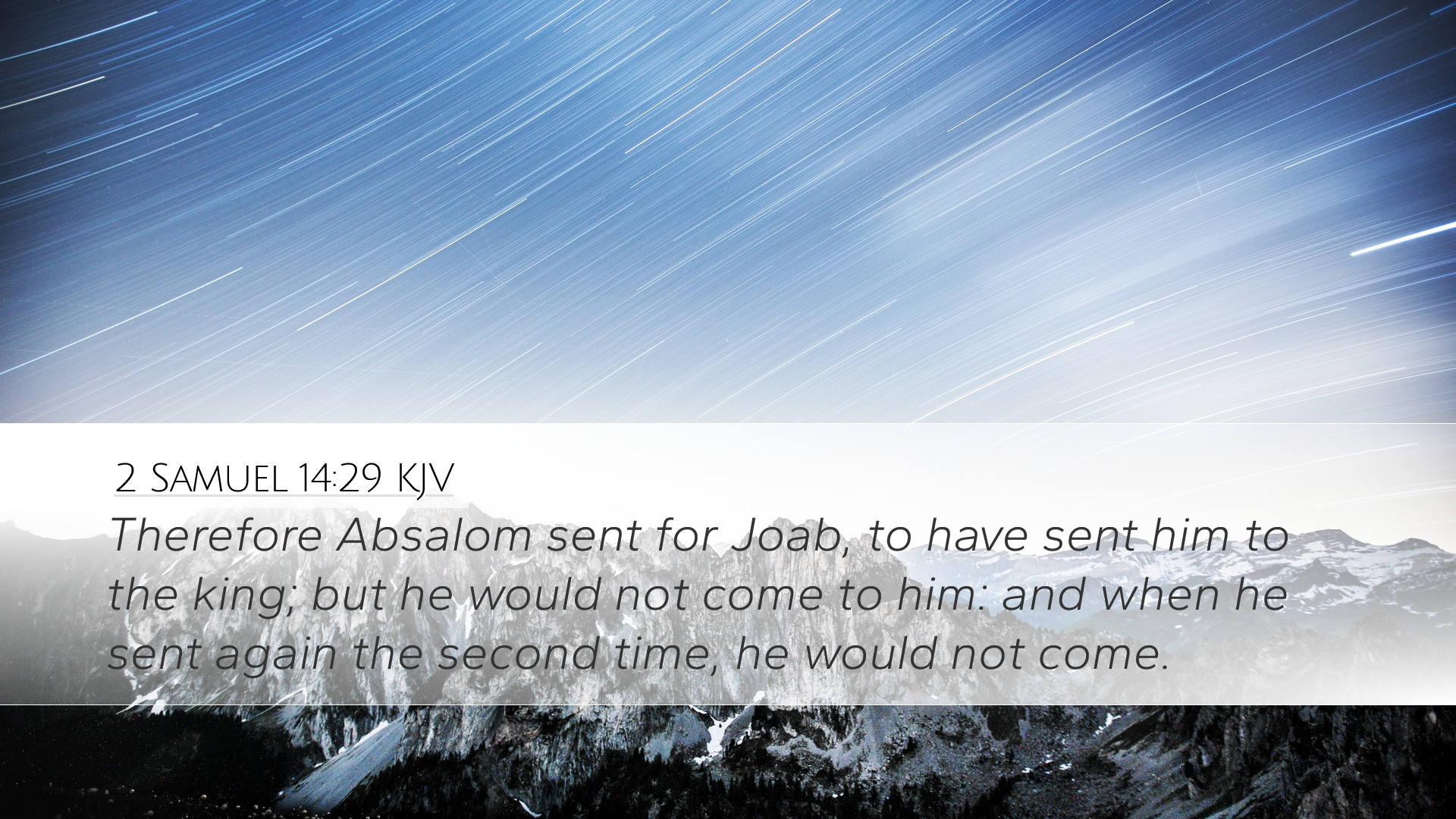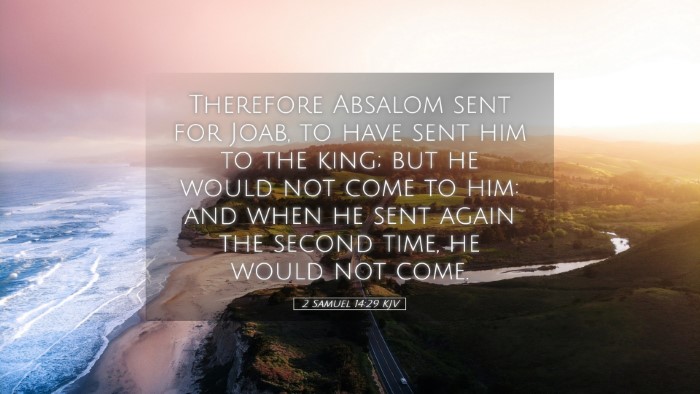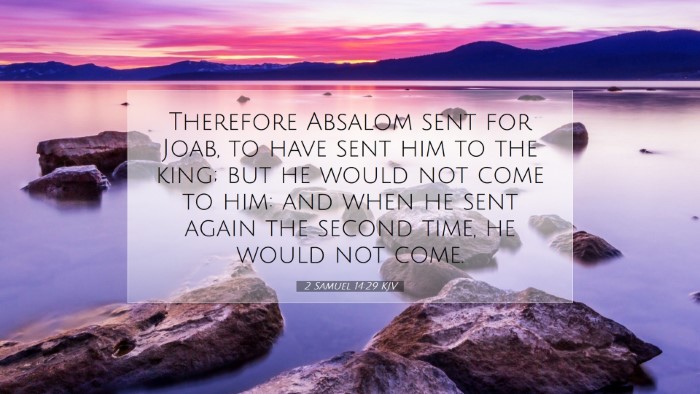Commentary on 2 Samuel 14:29
Verse: "And Absalom sent for Joab, to have sent him to the king: but he would not come to him: and when he sent again the second time, he would not come."
Introduction
The verse in question reflects a significant moment in the narrative of 2 Samuel, capturing the intense political and personal dynamics within David's family. This commentary draws from the insights of distinguished public domain theologians such as Matthew Henry, Albert Barnes, and Adam Clarke, focusing on the implications of Absalom's actions and the relationships at play.
Contextual Background
The backdrop of 2 Samuel 14 involves the estrangement of Absalom from King David, his father, following the murder of his half-brother Amnon. Absalom's actions are politically charged, representing aspirations of rebellion and personal vengeance. This narrative phase emphasizes themes of reconciliation, power dynamics, and the complexities of familial relationships.
Detailed Analysis
1. Absalom's Motivation
Absalom, having been in exile and yearning for restoration, seeks to reach out to his father through Joab, the commander of David's army. According to Matthew Henry, Absalom's endeavor reflects a duality of intention: he desires to mend fences with his father while simultaneously seeking to assert his own position of authority. The refusal of Joab to meet with him demonstrates the political tensions present, indicating Joab's reluctance to engage in the intricate affair of family politics.
2. Joab's Role and Response
Albert Barnes remarks on Joab’s critical position within the royal court, noting that he embodies the complexities of loyalty amidst familial strife. Joab’s repeated refusal to respond to Absalom illustrates the complexities of his support for David. His actions prompt questions regarding his allegiance and the political implications of ignoring Absalom's overtures.
Joab, as a military leader, held significant influence, and his unwillingness to intercede signifies the precariousness of Absalom’s situation. This behavioral dynamic is emblematic of broader themes within the text, which highlight loyalty, authority, and the tensions between familial bonds and political allegiances.
3. The Nature of Reconciliation
This verse highlights a critical turning point in Absalom’s narrative arc. Adam Clarke provides insights into the broader narrative function of this event. The delays and refusals encountered by Absalom complicate the notion of reconciliation and suggest a deeper examination of desires for restoration amidst conflict. Absalom’s desperation to reach out represents a common theme of estrangement and the complexities of seeking forgiveness.
Moreover, Clarke notes that strategic familial reconciliation is often fraught with challenges, especially when accompanied by past grievances. The refusal to engage signifies not just personal animosity but also the weight of unresolved political tensions that extend beyond mere family conflicts.
Spiritual Implications
This passage offers profound spiritual lessons for believers, particularly in the areas of forgiveness, the importance of reconciliation, and the ramifications of unresolved conflict. The actions and reactions among these figures encapsulate the struggles many face in navigating relational and spiritual integrity amidst personal and communal strife.
Theological Reflections
From a theological perspective, the events surrounding 2 Samuel 14:29 provide insights into the nature of God’s providence in human affairs. The stubbornness of Joab and Absalom's insistence highlight a divine orchestration that allows for human free will, often leading to complex outcomes. Leaders and congregants alike can learn from these dynamics, understanding that God often works through the maze of human choices to ultimately fulfill His plans.
The Pursuit of Peace
In contemporary application, the pursuit of peace and reconciliation in the community echoes the challenges faced by Absalom. This passage can be a reminder for church leaders and members to engage in persistent efforts towards peace, despite the difficulties that may arise. The theme of proactive engagement in relationships serves as a crucial discourse within both personal and communal settings.
Challenges of Leadership
The nuances of leadership shown in the reluctance of Joab to engage with Absalom also prompt a discussion regarding the responsibilities of leaders. This dynamic illustrates the need for wisdom, discernment, and courage in decision-making processes. Leaders are often faced with challenging situations that require them to balance loyalty with moral integrity and the demands of justice.
Conclusion
In summary, 2 Samuel 14:29 serves as a poignant reminder of the intricate interplay between human motives, relationships, and the overarching divine plan. The commentary derived from Henry, Barnes, and Clarke reveals rich theological insights that can profoundly impact pastors, students, theologians, and biblical scholars alike. By examining the complexities of Absalom’s actions and Joab’s responses, readers are encouraged to reflect on the deeper meanings of reconciliation, authority, and the quest for harmony in the face of conflict.


